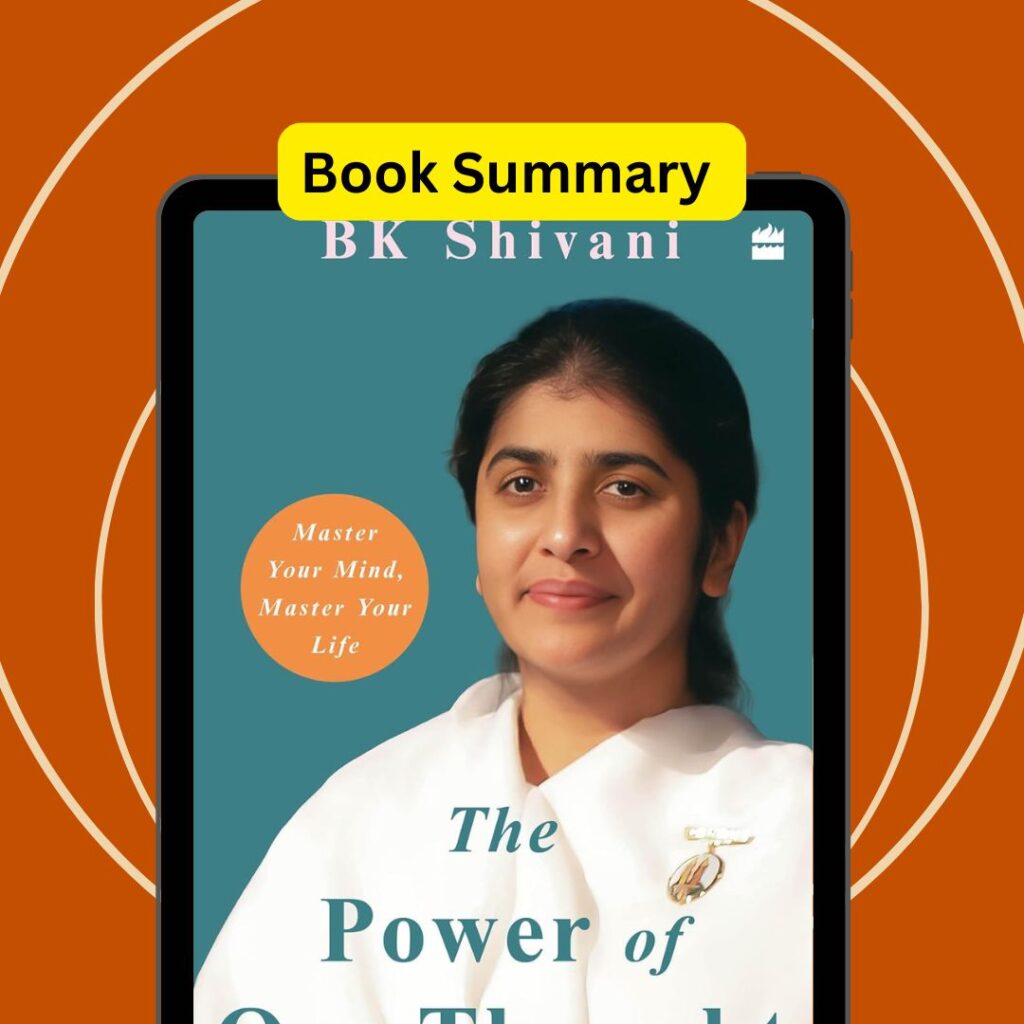The Power of One Thought Summary & Key Points
In a world filled with distractions and overwhelming thoughts, The Power of One Thought: Master Your Mind, Master Your Life by BK Shivani emerges as a beacon of clarity and guidance. This transformative book delves into the profound impact of our thoughts on our emotions, actions, and ultimately, our destinies. Through practical exercises, self-care practices, and deep reflections, BK Shivani empowers readers to harness the power of their minds to create positive changes in their lives. This blog post offers an extensive summary of the book, exploring its key themes, insights, and actionable strategies for personal growth.

Table of Contents
BK Shivani: A Brief Biography
BK Shivani is a renowned spiritual teacher and motivational speaker associated with the Brahma Kumaris organization. With a background in engineering and a passion for spirituality, she has dedicated her life to helping individuals achieve mental clarity and emotional well-being. Through her teachings and public speaking engagements, BK Shivani has inspired millions worldwide to embrace self-awareness and mindfulness. Her previous works have focused on personal development, relationships, and the power of positive thinking.
The Core Concept
At the heart of The Power of One Thought lies the idea that our thoughts shape our reality. BK Shivani emphasizes that every thought we entertain influences our feelings, attitudes, actions, habits, and ultimately our personality. By mastering our thoughts, we can unlock our true potential and lead fulfilling lives.
The Structure of the Book
The book is structured around several key concepts that guide readers toward understanding their thought patterns:
- Understanding Thoughts: BK Shivani begins by explaining the nature of thoughts and their cascading effects on emotions and behavior. She introduces the concept that thoughts are not just fleeting moments; they carry significant weight in shaping our experiences.
- Types of Thoughts: The author categorizes thoughts into four types—positive, negative, neutral, and harmful—highlighting how each type impacts our well-being. She encourages readers to cultivate positive thoughts while recognizing and addressing harmful ones.
- The Cascade Effect: One of the book’s central themes is the cascade effect of thoughts. BK Shivani illustrates how a single thought can lead to a chain reaction affecting feelings, attitudes, actions, and ultimately habits (referred to as sanskars). Understanding this cascade empowers individuals to take control of their mental processes.
- Self-Reflection Practices: Throughout the book, BK Shivani provides practical exercises for self-reflection and mindfulness. These exercises encourage readers to examine their thought patterns critically and make conscious choices about which thoughts to nurture.
- Harnessing Willpower: The author discusses the role of willpower in shaping our responses to situations. By exercising willpower consciously, individuals can override negative thought patterns and reinforce positive ones.
Key Themes
1. The Impact of Thoughts on Reality
BK Shivani emphasizes that what we think about is what we bring about. Our thoughts create our perceptions of reality; thus, cultivating a positive mindset can lead to a more fulfilling life.
2. Emotional Independence
A significant theme in the book is emotional independence—learning not to depend on external circumstances for happiness. By mastering one’s thoughts, individuals can cultivate inner peace regardless of external situations.
3. The Power of Affirmations
Throughout The Power of One Thought, BK Shivani advocates for using affirmations as tools for transformation. Positive affirmations help rewire negative thought patterns and reinforce self-belief.
4. Mindfulness and Presence
Mindfulness plays a crucial role in managing thoughts effectively. The author encourages readers to practice being present in each moment, allowing them to observe their thoughts without judgment.
5. Building Healthy Sanskars
Sanskars are deeply ingrained habits or tendencies formed over time through repeated actions or thoughts. BK Shivani discusses how understanding sanskars can lead to personal growth by identifying areas for change.
Practical Strategies for Mastering Your Thoughts
1. Daily Reflection Exercises
BK Shivani recommends incorporating daily reflection exercises into your routine. Spend a few minutes each day contemplating your thoughts and feelings without judgment. This practice fosters self-awareness and helps identify negative thought patterns.
2. Affirmation Practice
Create a list of positive affirmations that resonate with you personally. Repeat these affirmations daily to reinforce positive beliefs about yourself and your abilities.
3. Mindfulness Meditation
Engage in mindfulness meditation to cultivate presence and reduce mental clutter. Focus on your breath or a specific thought while observing any distractions that arise without attachment.
4. Journaling
Maintain a journal where you document your thoughts, emotions, and experiences regularly. Writing helps clarify your thinking process and provides insights into recurring patterns.
5. Visualization Techniques
Use visualization techniques to manifest your goals effectively. Picture yourself achieving your desired outcomes while focusing on the positive emotions associated with those achievements.
Overcoming Challenges
While striving for mastery over one’s thoughts can be empowering, challenges may arise:
1. Negative Self-Talk
Negative self-talk can undermine efforts to cultivate positivity. To combat this challenge, consciously replace negative statements with constructive affirmations whenever they arise.
2. External Influences
External influences such as social media or toxic relationships can contribute to negative thinking patterns. Limit exposure to negativity by curating your environment intentionally.
3. Resistance to Change
Change can be uncomfortable; resistance may surface when attempting new practices or thought patterns. Approach change gradually—start with small adjustments before implementing larger shifts in mindset.
The Transformative Power of One Thought
BK Shivani illustrates how one thought can lead to transformative change in various aspects of life:
- Personal Relationships: A single positive thought about someone can shift how you interact with them—promoting empathy rather than judgment.
- Career Success: Focusing on solutions rather than problems fosters creativity in professional settings—leading to innovative ideas that drive success.
- Health and Well-Being: Cultivating positive health-related thoughts encourages healthier lifestyle choices—impacting physical well-being over time.
FAQs
1. What is the main premise of The Power of One Thought?
The book emphasizes that every thought we have influences our feelings, attitudes, actions, habits, and ultimately our destiny. BK Shivani asserts that by mastering our thoughts, we can manifest a more fulfilling and successful life. The core message is encapsulated in the idea: What we think about is what we bring about
2. Who is BK Shivani, and what qualifies her to write this book?
BK Shivani is a renowned spiritual teacher and a practitioner of Rajyog Meditation for over 25 years. She has gained recognition for her ability to simplify complex spiritual concepts and has been awarded the ‘Nari Shakti Puraskaar’ by the Government of India for her contributions to transforming human behavior. Her teachings have reached millions through her television show Awakening with Brahma Kumaris
3. What techniques does the book offer to manage thoughts?
The Power of One Thought provides a variety of techniques to help readers channel their thoughts effectively, including:
- Reflection exercises: Encouraging self-awareness and introspection.
- Self-care practices: Promoting mental and emotional well-being.
- Personality development tools: Aiding in personal growth and transformation.
- Guided meditations: Helping to cultivate a peaceful mind and focused intentions
4. How does the book address the issue of negative thinking?
BK Shivani discusses how negative thoughts can lead to detrimental patterns known as sanskars, which are automated emotional responses like blaming or anger. She emphasizes the importance of examining and correcting our thought patterns to prevent these negative sanskaras from taking root in our lives
5. Is this book suitable for everyone?
Yes, The Power of One Thought is designed for anyone seeking personal growth, self-awareness, or a deeper connection with their inner self. The practical wisdom shared in the book makes it accessible to readers from all walks of life, whether they are new to spiritual literature or seasoned practitioners
6. What can readers expect to gain from this book?
Readers can expect to gain:
- A better understanding of how their thoughts influence their reality.
- Practical tools to cultivate positive thinking.
- Strategies for improving emotional health and building stronger relationships.
- Insights into achieving happiness and success through mindful thinking
7. How has this book been received by readers?
Many readers have praised The Power of One Thought for its clarity and practical approach to complex topics. Reviews often highlight its ability to inspire personal transformation and encourage positive changes in mindset. Readers appreciate BK Shivani’s relatable writing style, which makes profound concepts accessible
Conclusion
The Power of One Thought: Master Your Mind, Master Your Life by BK Shivani serves as an essential guide for anyone seeking to harness the transformative power inherent within their minds. By understanding how thoughts shape our realities—and implementing practical strategies for cultivating positivity—we can unlock our true potential while leading fulfilling lives.As we navigate an increasingly complex world filled with distractions and negativity—embracing the principles outlined in this book allows us not only to master our minds but also create meaningful connections with ourselves and others around us. This comprehensive summary captures essential elements from The Power of One Thought, ensuring an SEO-optimized structure suitable for engaging readers interested in personal development while emphasizing key messages relevant across generations. This blog post provides an extensive overview while ensuring it remains engaging for readers interested in self-improvement literature focused on mastering one’s mind through effective thinking strategies.
Discover marketing services, interviews & publishing tools at SharingStories.



